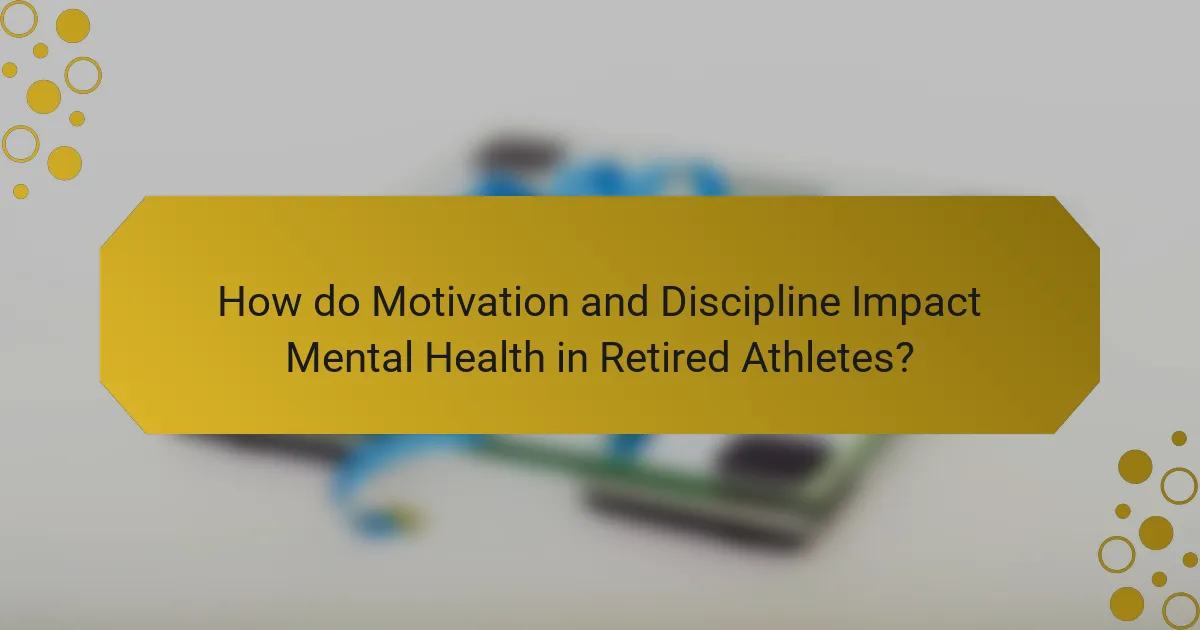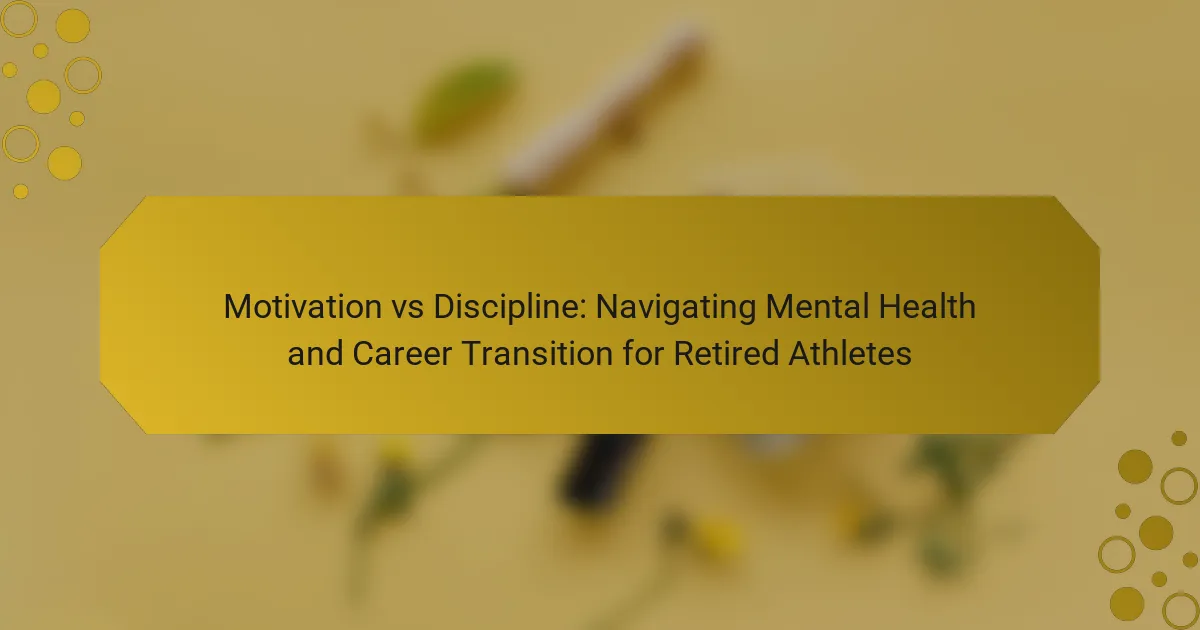Retired athletes often face significant challenges during career transitions, impacting their mental health. Understanding the roles of motivation and discipline is crucial for navigating these changes. This article explores how motivation drives engagement, while discipline fosters consistency in routines. It also discusses practical strategies for enhancing mental well-being and the importance of resilience and adaptability in achieving a fulfilling post-career life.

How do Motivation and Discipline Impact Mental Health in Retired Athletes?
Motivation and discipline significantly influence mental health in retired athletes by shaping their coping mechanisms and emotional resilience. Motivation drives engagement in new activities, while discipline fosters consistency in routines. Studies show that athletes with strong motivation and discipline experience lower rates of depression and anxiety during transitions. These attributes help in establishing a sense of purpose and maintaining social connections, which are crucial for mental well-being. In contrast, a lack of motivation can lead to feelings of isolation and uncertainty, negatively impacting mental health.
What are the key differences between motivation and discipline?
Motivation drives action through desire, while discipline enforces action through commitment. Motivation can fluctuate based on emotions and circumstances, whereas discipline remains consistent, fostering resilience and structure. Retired athletes often rely on discipline to maintain routines post-career, as motivation may wane without competitive pressures. Understanding this distinction is key for mental health and successful transitions.
How does mental health influence an athlete’s transition to retirement?
Mental health significantly influences an athlete’s transition to retirement by affecting their motivation and discipline. Athletes often struggle with identity loss and emotional challenges post-retirement, leading to decreased motivation. This can impact their discipline in maintaining physical health and adapting to new routines. Research shows that mental health support during this transition can enhance coping mechanisms, ensuring athletes remain engaged and motivated in life after sports. As a result, addressing mental health is crucial for a smoother transition and sustained well-being.

What universal challenges do retired athletes face during career transitions?
Retired athletes often struggle with motivation and discipline during career transitions, impacting their mental health. Common challenges include identity loss, lack of structure, and social isolation. These factors can lead to anxiety and depression, making the transition difficult. Developing new routines and seeking support can help mitigate these issues.
What common mental health issues arise post-retirement?
Retirement can lead to common mental health issues such as depression, anxiety, and identity crises. Many retired athletes struggle with a loss of purpose and motivation, impacting their overall well-being. Transitioning from a competitive environment to retirement often triggers feelings of isolation and uncertainty. Research indicates that approximately 40% of retired athletes experience significant mental health challenges, emphasizing the need for support systems and coping strategies during this transition.
How do social connections affect retired athletes’ mental well-being?
Social connections significantly enhance retired athletes’ mental well-being by providing emotional support and a sense of belonging. Strong relationships can reduce feelings of isolation and depression, common during career transitions. Engaging with peers fosters motivation and discipline, essential for adapting to post-athletic life. Research indicates that maintaining social networks contributes to improved mental health outcomes, highlighting the importance of community in this phase.
What role does family support play in mental health?
Family support plays a crucial role in enhancing mental health during career transitions for retired athletes. It provides emotional stability, encouragement, and a sense of belonging. Studies show that strong family connections can reduce anxiety and depression, fostering resilience. Additionally, family involvement can facilitate smoother transitions by helping athletes set new goals and maintain motivation. This support system can significantly influence the mental well-being of retirees, aiding their adaptation to life beyond sports.
How can community engagement improve mental resilience?
Community engagement significantly enhances mental resilience by fostering social connections and providing support. Engaging with others creates a sense of belonging, which is vital for emotional well-being. Studies show that social interactions can reduce stress and improve coping strategies during career transitions. Retired athletes often face identity challenges; community involvement helps them navigate these changes effectively. Additionally, shared experiences within a community can promote motivation and discipline, essential attributes for maintaining mental health.

What unique strategies can retired athletes employ for effective transition?
Retired athletes can employ unique strategies like setting clear goals, establishing routines, and seeking mentorship for effective transition. These methods enhance motivation and discipline, crucial for mental health during career changes. Additionally, embracing new challenges can foster resilience, helping athletes adapt to life beyond sports.
How can goal-setting enhance motivation post-career?
Goal-setting significantly enhances motivation for retired athletes by providing clear objectives and a sense of purpose. This structured approach helps maintain focus and fosters a positive mindset during career transitions. Setting achievable goals can lead to improved mental health outcomes, as it encourages a proactive attitude and reduces feelings of aimlessness. As a result, athletes experience increased satisfaction and fulfillment in their post-career lives, reinforcing the importance of goal-setting in this phase.
What role does continuous learning play in maintaining discipline?
Continuous learning enhances discipline by fostering adaptability and resilience in retired athletes. It helps maintain focus on goals and encourages the development of new skills. This ongoing commitment to self-improvement reinforces habits that support mental health during career transitions. As a result, athletes can navigate challenges more effectively, ensuring sustained motivation and discipline.

What rare traits contribute to a successful post-career transition?
Successful post-career transitions for retired athletes often rely on rare traits such as resilience, adaptability, and self-awareness. Resilience helps athletes cope with the emotional challenges of retirement. Adaptability allows them to navigate new environments and roles. Self-awareness fosters a deeper understanding of their strengths and weaknesses, guiding their career choices. These traits, while not common, significantly enhance the likelihood of a fulfilling transition.
How does self-awareness influence mental health outcomes?
Self-awareness significantly enhances mental health outcomes by fostering emotional regulation and resilience. It enables retired athletes to recognize their feelings and thoughts, leading to better coping strategies during career transitions. Studies show that self-aware individuals experience lower levels of anxiety and depression, which are common challenges in retirement. Furthermore, self-awareness facilitates goal setting and motivation, helping athletes to redefine their purpose beyond sports.
What uncommon coping mechanisms can aid in adjustment?
Uncommon coping mechanisms for retired athletes include creative expression, nature immersion, and mindfulness practices. These strategies can enhance adjustment during career transitions. Creative expression, such as art or writing, allows for emotional release and self-reflection. Nature immersion helps reduce stress and fosters a sense of connection. Mindfulness practices, including meditation and yoga, promote mental clarity and emotional stability. Exploring these options can lead to unique pathways for personal growth and resilience.

What practical steps can retired athletes take to boost mental health?
Retired athletes can enhance their mental health by establishing structured routines, seeking social support, and engaging in new activities. These practical steps foster motivation and discipline during career transitions.
1. Create a daily schedule to maintain structure and purpose.
2. Join support groups or connect with fellow retired athletes to share experiences.
3. Explore new hobbies or interests to discover passions outside of sports.
4. Consider professional counseling to address mental health challenges.
5. Practice mindfulness or meditation to improve emotional well-being.
6. Set achievable goals to cultivate a sense of accomplishment.
How can mindfulness practices support emotional well-being?
Mindfulness practices significantly enhance emotional well-being by fostering self-awareness and reducing stress. They help retired athletes navigate the mental health challenges of career transitions. Regular mindfulness exercises, such as meditation and breathing techniques, promote resilience and emotional regulation. Research indicates that these practices can lower anxiety levels and improve mood, making them effective tools for maintaining mental health during significant life changes.
What are the best practices for establishing a new routine?
To establish a new routine effectively, prioritize discipline over motivation. Start by setting clear, achievable goals that align with your mental health and career transition needs. Create a structured schedule that includes specific time blocks for activities. Consistency is key; aim to follow this schedule daily to build habits. Track your progress to stay accountable and make adjustments as needed. Celebrate small victories to reinforce positive behavior and maintain long-term engagement.
How can athletes identify transferable skills for new careers?
Athletes can identify transferable skills by reflecting on their experiences and assessing their strengths. They should analyze teamwork, leadership, and time management skills developed during their athletic careers. Networking with professionals in desired fields can provide insights into relevant skills. Additionally, seeking mentorship can help clarify which skills are most applicable to new career paths.
What resources are available for mental health support?
Various resources are available for mental health support tailored to retired athletes. Professional counseling services, support groups, and online platforms offer specialized assistance. Telehealth options provide accessibility, while community organizations focus on peer support. Mental health apps enhance self-care practices. Workshops and seminars address specific challenges during career transitions, promoting resilience and coping strategies.
What common mistakes should retired athletes avoid during transition?
Retired athletes should avoid common mistakes like neglecting mental health, failing to set new goals, and isolating themselves from social support. Transitioning requires discipline to maintain motivation and seek professional help if needed. Recognizing these pitfalls can facilitate a smoother adjustment to post-sport life.
How can retired athletes find balance between motivation and discipline?
Retired athletes can find balance between motivation and discipline by setting clear goals and establishing routines. Maintaining a structured daily schedule helps them stay focused on their new pursuits. Engaging in activities that ignite passion fosters motivation while discipline ensures consistent effort. Regular self-reflection can help assess progress and adjust strategies accordingly. Support from peers or mentors can enhance accountability and provide guidance during this transition.
What expert insights can guide retired athletes in their journey?
Retired athletes can benefit from expert insights that emphasize the balance between motivation and discipline during their transition. Understanding mental health is crucial; seeking professional support can aid in managing stress and anxiety. Setting realistic goals fosters a sense of purpose, while establishing a routine enhances discipline. Engaging in new activities or hobbies can reignite motivation and provide fulfillment. Building a supportive network of peers encourages sharing experiences and coping strategies.
